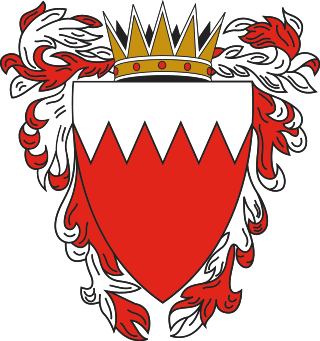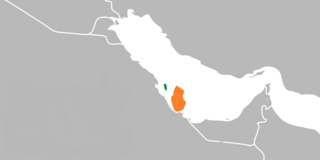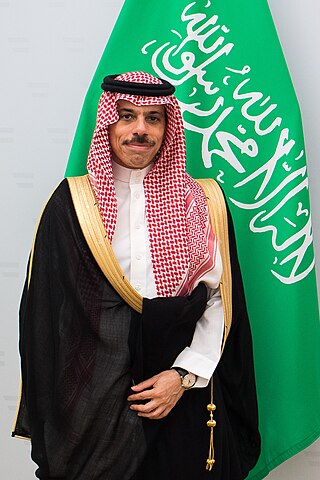 | |
Bahrain | Syria |
|---|---|
Bahrain and the Syrian Arab Republic established diplomatic relations on 23 January 1975. [1] Syria has an embassy in Manama. Bahrain reopened its embassy in Damascus in December 2018. [2]
 | |
Bahrain | Syria |
|---|---|
Bahrain and the Syrian Arab Republic established diplomatic relations on 23 January 1975. [1] Syria has an embassy in Manama. Bahrain reopened its embassy in Damascus in December 2018. [2]
On 8 August 2013, following Saudi Arabia's decision to recall its ambassador, Bahraini Foreign Minister Khalid bin Ahmed Al Khalifa announced that the Gulf archipelago state would recall its own ambassador. [3] Sunni sheikh Adel al-Hamad said that his son Abdulrahman was killed while fighting in Syria and that he had "hoped to fall as a martyr." He added: "He visited Syria once, then he returned to Bahrain where he prepared for his fighting gear and returned to Syria." In response, Interior Minister Rashid bin Abdullah al-Khalifa said that support should be given from the international community and that individuals should not be indoctrinated and radicalised. [4]
On June 19, 2022, Syrian President Bashar al-Assad received the credentials of Ambassador Waheed Mubarak Sayyar in an official ceremony attended by Foreign Minister Faisal Mekdad. [5]
Bahrain supported Syria's re-admission to the Arab League. Bahrain expressed its full support for "Syria’s sovereignty and stability" and the need to "build bridges with friends" as the foreign ministers of the two countries met. Syrian Foreign Minister Faisal Mekdad told his Bahraini counterpart, Abdullatif bin Rashid Al Zayani, that improving relations with other Arab countries is a priority for Syria, according to Syrian state-run news agency SANA. [6]

Bahrain plays a modest, moderating role in regional politics and adheres to the views of the Arab League on Middle East peace and Palestinian rights. Since achieving independence in 1971, Bahrain has maintained friendly relations with most of its neighbours and with the world community. It generally pursues a policy of close consultation with neighbouring states and works to narrow areas of disagreement.

Hamad bin Isa bin Salman Al Khalifa is King of Bahrain since 14 February 2002, after ruling as Emir of Bahrain from 6 March 1999.

Saud bin Faisal Al Saud, also known as Saud Al Faisal, was a Saudi Arabian statesman and diplomat who served as the foreign minister of Saudi Arabia from 1975 to 2015. A member of the Saudi royal family, he was the longest-serving foreign minister in world history.

Khalid bin Ahmed Al Khalifa is a Bahraini diplomat who served as Bahrain's Minister of Foreign Affairs from 2005 until January 2020. Khalid became only the second foreign minister in Bahrain's history after replacing Mohammed bin Mubarak Al Khalifa who then became Bahrain's deputy prime minister.

Bilateral relations exist between Bahrain and Russia.

Relations have existed between Bahrain and Israel since Bahrain achieved its independence in 1971. In recent years, relations between the two countries have been thawing, and the countries agreed to establish diplomatic relations in September 2020. The foreign minister of Bahrain Khalid bin Ahmed Al Khalifa has been quoted saying "Israel is part of the heritage of this whole region, historically. So, the Jewish people have a place amongst us." The common threat of Iran has provided common ground for a thaw in what were once tense relations. Bahrain's foreign policy traditionally supports the creation of an independent Palestinian state.

Syria–United Arab Emirates relations refer to the relationship between the United Arab Emirates (UAE) and the Syrian Arab Republic. The UAE has an embassy in Damascus and Syria has an embassy in Abu Dhabi and a consulate-general in Dubai. Both countries are members of the Arab League, part of the Middle East region and share close cultural ties.
The international reactions to the 2011 Bahraini uprising include responses by supranational organisations, non-governmental organisations, media organisations, and both the governments and civil populaces, like of fellow sovereign states to the protests and uprising in Bahrain during the Arab Spring. The small island nation's territorial position in the Persian Gulf not only makes it a key contending regional power but also determines its geostrategic position as a buffer between the Arab World and Iran. Hence, the geostrategic implications aid in explaining international responses to the uprising in Bahrain. Accordingly, as a proxy state between Saudi Arabia and Iran, Bahrain's domestic politics is both wittingly and unavoidably shaped by regional forces and variables that determine the country's response to internal and external pressures.

Saudi Arabia–Syria relations refer to bilateral and economic relations between Saudi Arabia and the Syrian Arab Republic. Diplomatic ties between these two countries of the Middle East have long been strained by the major events in the region. Saudi Arabia has an embassy in Damascus, and Syria has an embassy in Riyadh. Both countries are members of the Arab League and share close cultural ties.

Bilateral relations exist between the State of Qatar and the Kingdom of Bahrain. They first began in 1971.

Bilateral relations exist between the countries of Bahrain and Iran. Since the 1979 Iranian Revolution, relations between the two countries have been strained over various geopolitical issues such as the interpretations of Islam, aspirations for leadership of the Islamic world, and relations with the United States, Europe, and other Western countries. In addition, Iran has been severely critical of Bahrain for hosting the United States Fifth Fleet within the Persian Gulf at the Naval Support Activity Bahrain base.

Iran–Qatar relations refer to the bilateral relations between the Islamic Republic of Iran and the State of Qatar. Iran has an embassy in Doha while Qatar has an embassy in Tehran. Qatar and Iran have close ties.

Historic and current bilateral relationship exist between Bahrain and Japan. Diplomatic relations were first established in 1972, and since then they have had increasing economic, cultural, and military cooperation, with Japan becoming one of the major trading partners of Bahrain. Several high-level official visits have taken place, including by King Hamad bin Isa Al Khalifa to Japan in 2012, Crown Prince Salman in 2013, and Prime Minister Shinzo Abe to Bahrain in 2013, with the governments of both countries expressing their intent to continue to increase their bilateral relations.

Saudi Arabia–Qatar relations refers to the current and historical relationship between the Kingdom of Saudi Arabia and the State of Qatar. Prior to 2017, the two countries maintained cordial ties. Qatar was mainly subservient to Saudi Arabia in matters relating to foreign policy. Hamad bin Khalifa Al Thani's assumption of power saw Qatar reclaim its sovereignty in foreign affairs, often diverging from Saudi Arabia on many geopolitical issues. In 1996, the Qatari government launched Al Jazeera in a bid to consolidate soft power. One of the most watched news stations in the Arab world, Al Jazeera proved to be a wedge in the two's bilateral relations as it routinely criticized Saudi Arabia's ruler. The network also provided a platform for Islamist groups which are considered a threat to Saudi Arabia's monarchy.

The Qatar–Saudi Arabia diplomatic conflict refers to the ongoing struggle for regional influence between Qatar and the Kingdom of Saudi Arabia (KSA), both of which are members of the Gulf Cooperation Council (GCC). It is sometimes called the New Arab Cold War. Bilateral relations are especially strained since the beginning of the Arab Spring, that left a power vacuum both states sought to fill, with Qatar being supportive of the revolutionary wave and Saudi Arabia opposing it. Both states are allies of the United States, and have avoided direct conflict with one another.

Algeria–Syria relations refers to the relationship between the People's Democratic Republic of Algeria and the Syrian Arab Republic. Algeria has an embassy in Damascus; while Syria has an embassy in Algiers. Both are members of the Arab League. During the Syrian conflict, Algeria was one of the few Arab countries that maintained close ties with the Government of Syria under Bashar al-Assad, and has defended Syria within the Arab League.

Saudi Arabia–Palestine relations refers to the bilateral relationship between the Kingdom of Saudi Arabia and the State of Palestine.

Prince Faisal bin Farhan bin Abdullah bin Faisal bin Farhan Al Saud is a Saudi Arabian diplomat and politician and a member of the House of Saud. Prince Faisal has served as the current Saudi ambassador to Germany since 27 March 2019. He has also served as foreign minister of Saudi Arabia since 23 October 2019, when he was appointed to that position by a royal decree issued by King Salman. Prince Faisal was born in Frankfurt, West Germany and spent a part of his childhood and young adulthood in that country, which is why he speaks fluent German according to German news media.

The Bahrain–Israel normalization agreement, officially Abraham Accords: Declaration of Peace, Cooperation, and Constructive Diplomatic and Friendly Relations, is an agreement to normalize diplomatic and other relations between Bahrain and Israel. The agreement was announced by President Donald Trump on September 11, 2020, and followed on from a joint statement, officially referred to as the Abraham Accords, by the United States, Israel and the United Arab Emirates (UAE) on August 13, 2020. It was formally signed on September 15, 2020, at the White House in Washington, D.C., and made Bahrain the fourth Arab state to recognize Israel and the second within a month.
The 2022 Arab League summit, officially the 31st Ordinary Session of the Council of the League of Arab States at the Summit Level, was held at its 31st session in Algiers. This was the fourth time the city hosted this event. All Arab countries were represented at the event, with the exception of Syria, which has been suspended since 2011 due to the ongoing crisis. The summit was postponed several times before its date was confirmed on 1 November 2022. It was initially to be held in 2020, 2021 and finally March 2022. But due to the COVID-19 pandemic, it was postponed to November to coincide with the anniversary of the outbreak of the Algerian Revolution. The summit was also the first since a number of countries normalized relations with Israel, causing a schism in the Arab position, which had remained united over what was stipulated in the Beirut 2002 initiative.